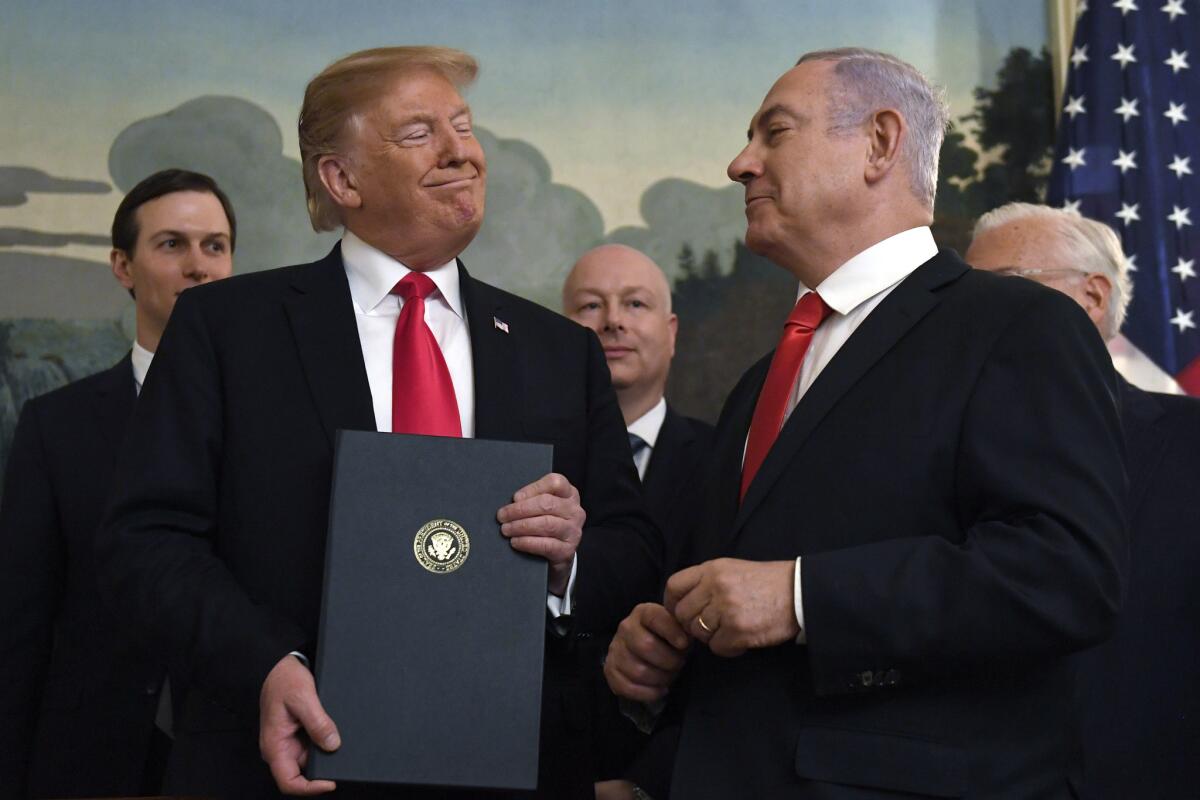Netanyahu says Trump named Iran’s Revolutionary Guard a terrorist group at his request

Reporting from Jerusalem — Israeli Prime Minister Benjamin Netanyahu, facing a hotly contested bid for a fourth term, tweeted on the eve of the election that the Trump administration designated Iran’s Islamic Revolutionary Guard Corps as a foreign terrorist organization at his request.
“Thank you, my dear friend, the president of the United States, Donald Trump, for having decided to designate Iran’s Revolutionary Guards as a terrorist organization,” he wrote in Hebrew on Twitter on Monday. “Thank you for responding to another of my important requests, which serves the interests of our countries and countries of the region.”
His English-language thank you note posted later omitted taking credit, but said of Trump, “Once again you are keeping the world safe from Iran aggression and terrorism.”
In Israel, the move by the Trump administration is being viewed by some as an election eve gift to Netanyahu.
Trump administration designates Iran’s Revolutionary Guard a terrorist group »
Raz Zimmt, a Tel Aviv University expert on Iran, said in an interview with The Times, “The timing appears connected to the elections, even if the subject has been under discussion for some time.”
Shimrit Meir, a Middle East analyst, tweeted that “the timing, of course, is last-minute help from afar for pal Netanyahu.”
Meir, however, expressed doubt that the gambit would have much effect. “It is difficult to believe that a single undecided Israeli voter will decide one way or the other due to this decision, but it means a few more hours in which Iran and Trump and Netanyahu and the Iran deal will be talked about.”
Immediately after the State Department announcement, and 12 hours before polls open, interim Foreign Minister Yisrael Katz effusively thanked Trump, saying the decision “will weaken Iran’s ability to advance its nuclear program and support terror in the region.”
He added that the change in policy will also “significantly strengthen Israel’s ability to fight against Iranian aggression in Syria and the area.”
Israelis were not alone in viewing the Trump administration move as a last-minute assist to Netanyahu.
In a Sunday tweet anticipating the Trump decision, Iranian Foreign Minister Mohammad Javad Zarif issued what sounded like a threat against U.S. forces in the Middle East.
“Netanyahu Firsters who have long agitated for FTO designation of the IRGC fully understand its consequences for US forces in the region,” he wrote on Twitter. “In fact, they seek to drag US into a quagmire on his behalf. @realDonaldTrump should know better than to be conned into another US disaster.”
Netanyahu, with the rightist Likud Party, is vying to be the longest-serving prime minister in Israel’s history. But after a criminal indictment on corruption charges, the 69-year-old’s reelection is not assured.
Israel’s Netanyahu, consummate political survivor, faces voter test and legal peril »
The new centrist Blue and White party of his opponent, former Israeli army chief Benny Gantz, has been polling strongly.
Netanyahu has made his close alliance with Trump a hallmark of the 2019 electoral campaign. It’s a sharp contrast to the years of friction with then-President Obama and Netanyahu’s accusation that Israel’s future had been endangered by that administration’s signature foreign policy initiative toward Iran, the nuclear pact from which the Trump administration withdrew.
In a statement, the Israeli Foreign Ministry said the “significant” American move on the Revolutionary Guard “is another step in the policy of maximizing pressure on Iran, led by the United States and which Israel is a partner in.”
The American decision was a result of an “Iranian terror policy ... sowing havoc in the Middle East and the entire world,” the ministry said, “from Syria and Lebanon to Argentina and Buenos Aires.”
Tarnopolsky is a special correspondent.
More to Read
Sign up for Essential California
The most important California stories and recommendations in your inbox every morning.
You may occasionally receive promotional content from the Los Angeles Times.










